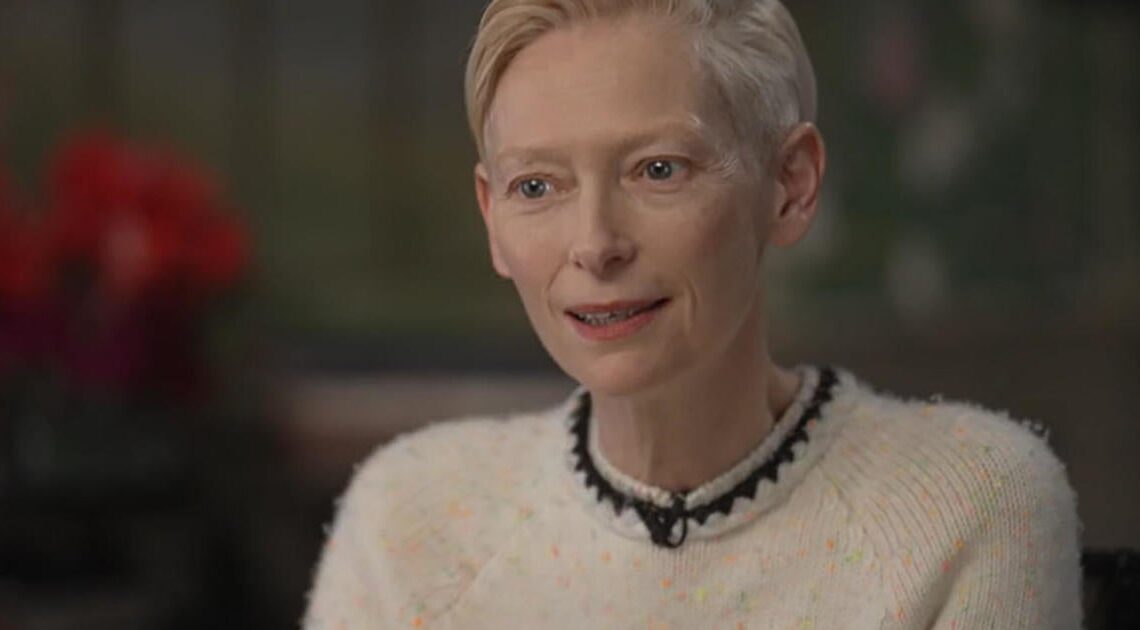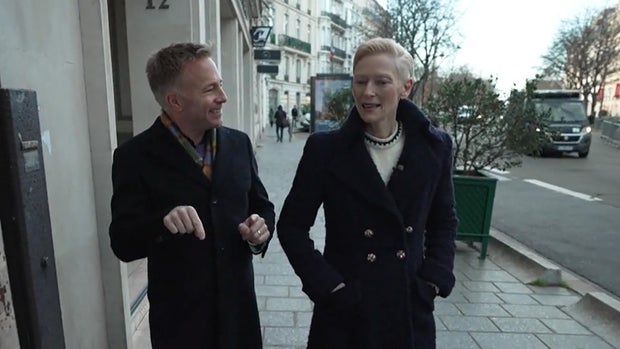
Tilda Swinton on portraying a life’s end in “The Room Next Door”
5. January 2025[ad_1]
“I’ve spent quite a lot of my life over the last 15 years in the really honored, privileged position of being close to people who are reaching the end of their lives,” said actress Tilda Swinton. “And then to make a film about it is a blessing on a blessing, really.”
Drawing on those experiences helped Swinton earn an acting nomination for Sunday’s Golden Globes. In “The Room Next Door,” she portrays a woman with a terminal cancer diagnosis. Her character, Martha, faces questions about how to live. “My first ‘Martha,’ if you like, was Derek Jarman,” she said. The director, artist and gay activist (who cast Swinton in her first film, “Caravaggio”), was diagnosed with HIV in 1986.
The Oscar-winner credits Jarman with finding her a home in cinema, and showing her how collaborative filmmaking could be. They made seven feature films together before his death, in 1994.
She said, “He modeled a kind of attitude to his dismount that I drew on, like, to my core, for myself, and in fact I have reflected in the portrait of Martha.”
I asked, “You think about specific people as you’re acting?”
“Well, an attitude, yeah, that I’ve seen played out, that I’ve witnessed – my parents, my children’s beloved father, John Byrne, who died last year,” she replied. “It’s been such a privilege to be in that hot seat beside them and seeing them face the inevitable with such dignity and humor and wit, and just power.”
“The Room Next Door” is the first English-language feature film by Spanish director Pedro Almodóvar. Swinton’s co-star, Julianne Moore, is another Academy Award-winner. “He asked me who I wanted,” said Swinton. “It was her face that I saw at the end of the bed. It was her listening face that I felt was the right face.”
To watch a trailer for “The Room Next Door” click on the video player below:
Swinton has made more than 80 films, winning an Oscar for the 2007 “Michael Clayton.” Still, she says the big studio productions are the exception. She veers toward independent films, thriving in the experimental.
Asked about the expressiveness of her eyes, and of how much she can “say” without saying anything, Swinton said, “I suppose I started in silent cinema with Derek Jarman. I actually prefer silent cinema.”
Why? “I loved it first,” she said. “And then when I started working with Derek, I found my comfort zone in front of a silent camera. I think it’s a very rare screenplay that is able to approach what I’m really interested in, which is inarticulacy. Even now, I sort of know what I want to say to you, but I can’t pull the words out my ear, and they’re coming out a little wrong.”
I asked, “Can you say it with your eyes?”
“That’s what I’m really interested in!” she laughed.
Zeitgeist Films; Kino Lorber; Sony Pictures Classics; Oscilloscope Pictures; Warner Brothers; Weinstein Company; Fox Searchlight; Neon
She’s played a tortured mother in “We Need to Talk About Kevin,” and she’s not exactly cuddly in the Almodòvar film. But just before our interview, joking about some fabulous boots she was wearing, we glimpsed another side of Swinton.
I asked, “You’ve done a lot of films, but you can seem so serious … Like this? Not at all. There is a curiosity and a warmth, and you jump out.”
“The jumping out, I get. The seriousness, I am a little confused by.”
“What do you mean?”
“I am always doing comedy,” she said. “I feel everything I do is funny. But I think maybe because I’m a shy person and I don’t tend to smile with my teeth all over the place, there’s has been an assumption that there was more seriousness than nonsense, but there is a hell of a lot of nonsense.”
“You’re a shy person?”
“Yeah.”
“You picked a tough career for that!”
“I know! It’s strange, isn’t it? But I think what makes me most shy is being singled out.”
So, when she’s alone on the red carpet, she finds that ensemble approach through fashion. “It’s very playful. My relationship with fashion is entirely dependent on my relationship with certain individuals who are my friends, who happen to be some of the greatest designers in the world, who give me clothes. And that makes going out into a public arena when you are someone who is not an extrovert, not only much easier, but actually possible.”
When we met in Paris. Swinton had just flown in from a trip to China for Chanel. She was wearing a military coat: “I first fell in love with my father’s uniforms. My mother was always in some nice silk dress, but I was really interested in my father’s uniform.”
CBS News
Swinton grew up the daughter of a military officer in an aristocratic family in Scotland. When we met, Swinton was looking forward to getting home to her remote seaside town in Scotland, where she raised twins, and has an artist-partner, Sandro Kopp, and a number of springer spaniels.
I asked about descriptions of her as “an icon of androgynous beauty,” and naturally radiating “a certain otherworldliness.”
“The otherworldliness does make me laugh a bit,” she said, “because the truth is I look like the members of my family. I think the otherworldly might have something to do with the fact that I don’t wear mascara and I’m very pale. As my grandmother would say, it would be a dull world if everybody felt the same. I don’t feel otherworldly. I feel very much present.”
CBS News
Swinton is very much present, whether at an interview or as an actor. And in navigating Hollywood, those roots in Scotland help her find balance.
“Maybe it’s made me braver,” she said. “Maybe I wouldn’t be able to pack that small bag and engage in worlds that are very alien to where I come from, if I didn’t know I was going home to something that feels absolutely real to me.”
For more info:
- Pedro Almodóvar’s “The Room Next Door,” released by Sony Pictures Classics, is now playing in select theaters
Story produced by Justine Redman and Aria Shavelson. Editor: Ed Givnish.
[ad_2]
Source link



